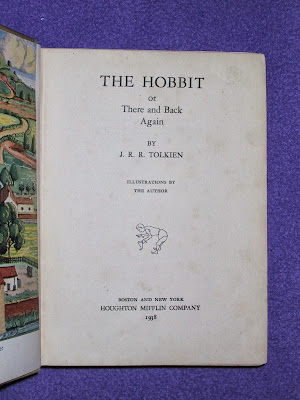This is one of the most freshly original and delightfully imaginative books for children that have appeared in many a long day. Like "Alice in Wonderland," it comes from Oxford University, where the author is Professor of Anglo-Saxon, and like Lewis Carroll's story, it was written for children that the author knew (in this case his own four children) and then inevitably found a larger audience.
The period of the
story is between the age of Faerie and the dominion of men. To an adult who
reads of Smaug the Dragon and his hoard, won by the dwarves but claimed also by
the Lake men and the Elven King, there may come the thought of how legend and
tradition and the beginning of history meet and mingle, but for the reader from
8 to 12 "The Hobbit" is a glorious account of a
magnificent adventure, filled with suspense and seasoned with a quiet humor
that is irresistible.
Hobbits are (or
were) a small people, smaller than dwarves - and they have no beards - but very
much larger than liliputians. There is little or no magic about them, except
the ordinary everyday sort which helps them to disappear quietly and quickly
when large, stupid folk like you and me come blundering along, making a noise
like elephants which they can hear a mile off. They are inclined to be fat in
the stomach; they dress in bright colors, chiefly green and yellow; wear no
shoes because their feet grow natural leathery soles and thick, warm brown
hair; have long, clever, brown fingers, good-natured faces and laugh deep,
fruity laughs (especially after dinner, which they have twice a day, when they
can get it).
Bilbo Baggins was a
hobbit whom we find living in his comfortable, not to say luxurious, hobbit
hole, for it was not a dirty, wet hole, nor yet a bare, sandy one, but inside
its round, green door, like a porthole, there were bedrooms, bathrooms,
cellars, pantries, kitchens and dining rooms, all in the best of hobbit taste.
All Bilbo asked was to be left in peace in this residence, known as
"Bag-End," for hobbits are naturally homekeeping folk, and Bilbo had
no desire for adventure. That is to say, the Baggins' side of him had not, but
Bilbo's mother had been a Took, and in the past the Tooks had intermarried with
a fairy family. It was the Took strain that made the little hobbit, almost against
his will, respond to the summons of Gandalf the Wizard to join the dwarves in
their attempt to recover the treasure which Smaug the dragon had stolen from
their forefathers. Bilbo has an engaging, as well as an entirely convincing,
personality; frankly scornful of the heroic (except in his most Tookish
moments), he nevertheless plays his part in emergencies with a dogged courage
and resourcefulness that make him in the end the real leader of the expedition.
After the dwarves
and Bilbo have passed "The Last Homely House" their way led through
Wilderland, over the Misty
Mountains
The tale is packed
with valuable hints for the dragon killer and adventurer in Faerie. Plenty of
scaly monsters have been slain in legend and folktale, but never for modern
readers has so complete a guide to dragon ways been provided. Here, too, are
set down clearly the distinguishing characteristics of dwarves, goblins, trolls
and elves. The account of the journey is so explicit that we can readily follow
the progress of the expedition. In this we are aided by the admirable maps
provided by the author, which in their detail and imaginative consistency,
suggest Bernard Sleigh's "Mappe of Fairyland."
The songs of the
dwarves and elves are real poetry, and since the author is fortunate enough to
be able to make his own drawings, the illustrations are a perfect accompaniment
to the text. Boys and girls from 8 years on have already given "The
Hobbit" an enthusiastic welcome, but this is a book with no age limits.
All those, young or old, who love a fine adventurous tale, beautifully told,
will take "The Hobbit" to their hearts.
Anne T.
Eaton
New York Times -- March 13, 1938
New York Times -- March 13, 1938











